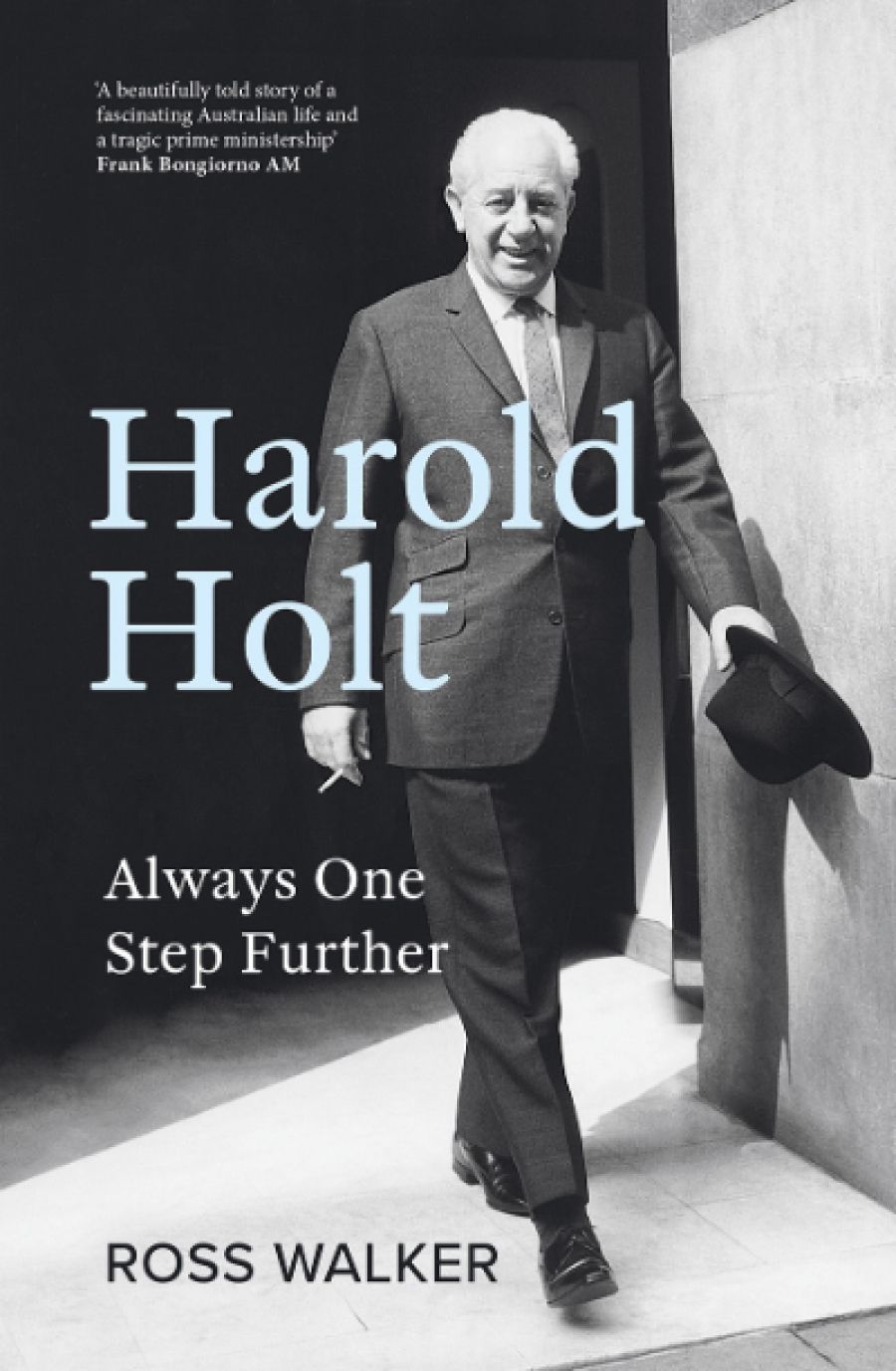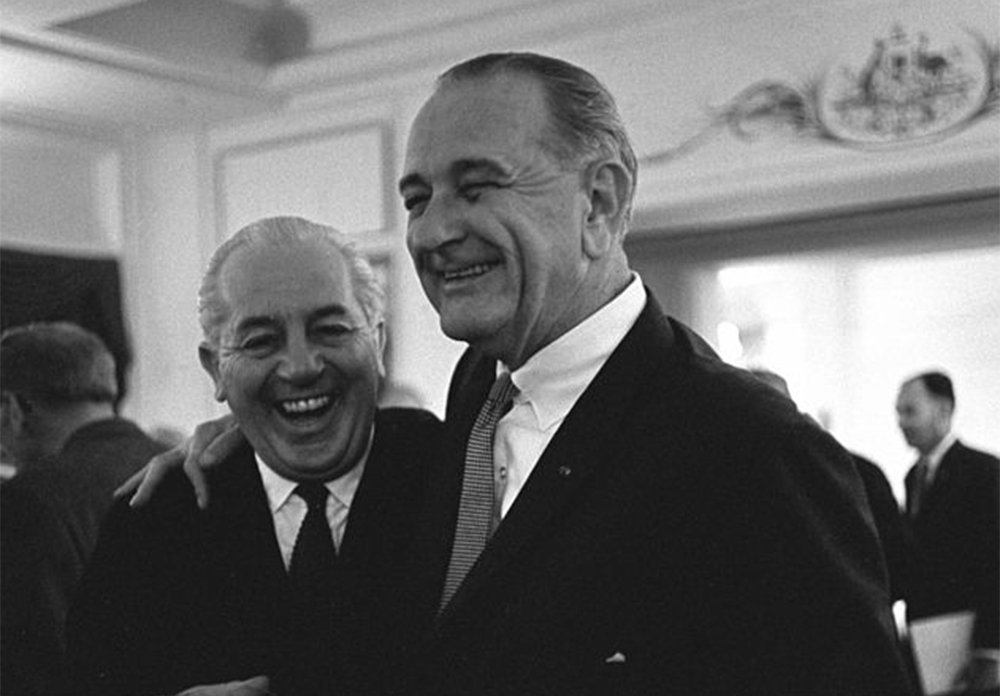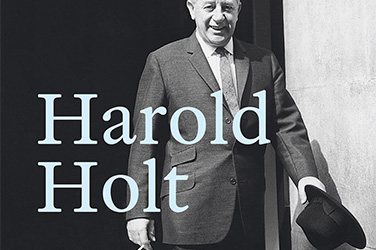
- Free Article: No
- Contents Category: Biography
- Review Article: Yes
- Article Title: Handsome Harold
- Article Subtitle: Mythologising Robert Menzies’ successor
- Online Only: No
- Custom Highlight Text:
If Scott Morrison taught us nothing else, it is that we must pay attention to the behaviour of leaders who can take decisions that potentially impact us all. That is reason enough to welcome serious political biography. Yet a reader new to the field might be puzzled to find on her bookshop shelves (or in an online search) multiple volumes on, say, Robert Menzies or Bob Hawke and now Harold Holt – even Scott Morrison – and many others. There is no dearth of choice: the question is how to choose?
- Article Hero Image (920px wide):

- Article Hero Image Caption: Harold Holt and Lyndon Baines Johnson at a reception, 1966 (photograph by Yoichi Okamoto, Lyndon Baines Johnson Library and Museum. Image Serial Number: A3338-18A, via Wikimedia Commons)
- Alt Tag (Article Hero Image): Harold Holt and Lyndon Baines Johnson at a reception, 1966 (photograph by Yoichi Okamoto, Lyndon Baines Johnson Library and Museum. Image Serial Number: A3338-18A, via Wikimedia Commons)
- Featured Image (400px * 250px):

- Alt Tag (Featured Image): James Walter reviews 'Harold Holt: Always one step further' by Ross Walker
- Book 1 Title: Harold Holt
- Book 1 Subtitle: Always one step further
- Book 1 Biblio: La Trobe University Press, $34.99 pb, 324 pp
- Book 1 Readings Link: booktopia.kh4ffx.net/Zda0JQ
Authors and their publishers wrestle with this: what is there to say that is not already said; can rigorous (perhaps theoretical) analysis tell us something new; are there distinctive, yet untapped audiences that might be reached by an original approach; and what is the selling point? Readers will have their own preferences and may be hooked by an arresting title, a compelling cover blurb, or a tantalising review, but we can assume they will be curious about politics and political life.
Ross Walker claims originality, explaining that his aim in writing a new biography of Harold Holt has been ‘to strike a midway point between biography and narrative non-fiction – history told as a story’. Further, he asserts that there is comparatively little written about Holt, and little that ‘has given much idea of the inner life of the man’, despite, he concedes, a ‘fine’ biography by Tom Frame (The Life and Death of Harold Holt, 2005), for which he is especially grateful.
Walker spends considerably more time on Holt’s family circumstances and pre-political life than does Frame. He writes of family instability (the loss of his mother through early separation, then divorce and her death when he was a teenager, and the physical and emotional distance of his father), leaving Holt with a predisposition towards strong father figures and a craving for affection and attention. It is a feasible rationale for Holt’s dependent relationships with other significant men, his need for everyone to like him, his serial philandering (a racy undertow that pulls readers in), and the drive for politics – the big stage on which he would gain attention. Walker’s brio carries the reader along, and himself too, as the extent of his admiration becomes apparent.
When Walker turns to politics, the literary momentum is sustained through clever use of illuminating vignettes. But Walker’s touch is less sure in this domain. Little is said about Holt’s long wait for succession, or about the senior figures with more talent who disdained the party room glad-handing which was Holt’s forte (such as Paul Hasluck), or who came and went as they realised that the ‘old man’ would not facilitate their accession (Richard Casey, Percy Spender, Garfield Barwick), ensuring that Holt became the heir apparent, the last man standing.
The depiction of Holt as an adept administrator and an ‘outstanding parliamentarian and a highly successful minister in the portfolios of Immigration, and Labour and National Service’ is apt. Here, Holt’s charm and talent for negotiation were strengths. But there is insufficient attention to the experienced friends and public servants who provided the means for this success. Roland Wilson at Treasury is acknowledged as a significant mentor. Holt’s ‘mixed record as Treasurer’ stemmed from his subservience to the Treasury line, which led to the public relations disaster of the 1960 ‘credit squeeze’ budget and failed attempts to fix the damage in a subsequent mini budget. This ineptitude was blamed for the Coalition’s near loss of the 1961 election. All is glossed over swiftly, without recognition of departmental politics. Holt bore the cost but continued to rely upon Wilson’s strength, and Menzies decided to stay on longer than he had planned while Holt’s reputation was rehabilitated.
Much the same can be said of Walker’s treatment of Holt’s truncated term as prime minister (1966–67). There were significant initiatives on Holt’s watch: first steps in the reversal of the White Australia policy; improved relations with Asia-Pacific neighbours; more support for the arts; liberalisation in Indigenous policy; and the revision of public service rules to remove barriers to women’s employment. But all of these were in preparation before Menzies’ retirement, developed by community activists, public servants, and more liberal politicians, waiting for the opportunity Menzies’ departure provided. Again, friends and mentors, such as Nugget Coombs, provided significant tutelage to Holt in such areas. Holt’s commitment and hard work were important, but these were not the bold incursions of an adventurer risking ‘one step further’. It was a collective effort rather than a demonstration of heroic leadership. Walker acknowledges Coombs’s mentorship but ignores Coombs’s perceptive evaluation of his friend: ‘he was not even potentially a great prime minister … too nice a person to exercise power effectively’.
The most laboured of Walker’s vignettes concerns Holt’s relations with President Lyndon Baines Johnson. Their mutual regard, the affection that LBJ developed for his Australian friend, and his genuine distress at Holt’s death are well documented. Yet the attempt to depict them as paired reformist visionaries, with similar attributes of charm and negotiation, rings hollow. Walker goes to great lengths to represent Holt as decent, kindly, and compassionate – and the source of initiatives mentioned above. But he had none of LBJ’s cunning, mendacity, ability to control others, or Machiavellian ruthlessness, let alone the ambition of LBJ’s proposed ‘Great Society’ program, which would have been truly transformational had Johnson’s administration not been cruelled by its disastrous pursuit of the Vietnam War. Holt’s deference to LBJ’s charm and persuasion, and his failure – shared by Menzies – to accept Hasluck’s advice that while Australia’s commitment to the Vietnam engagement was necessary there should be caution about hewing too closely to US policy, began to undermine the Coalition too.
Three tensions in Holt’s actions provide the narrative impetus for Walker’s story: the disparity between a sensible and measured disposition and being unable ‘to leave well enough alone’; an extrovert who nonetheless ‘savoured the solitude of the underwater world’; and a life-affirming inclination paired with self-destructive episodes, ‘as if inwardly compelled to imperil his physical safety’. Hence, always on the edge, ‘always one step further’, argues Walker, in life, personal relationships, and politics.
It is a narrative arc that leads inexorably to the final tragedy: Holt going too far in risking the surf at Portsea and being lost at sea. Well, we all knew this was coming, but does the trope of a death foretold in the manner that Walker’s literary flourishes imply (on that final drive to Portsea, ‘the tea-trees lining the highway waved in the wind, as if beckoning him on’) help us in understanding Holt’s achievement? It is pertinent to remember, as Ken Inglis once warned, that our past is not the historical subject’s future, that consciousness of an endpoint of which one’s hero cannot be aware, distracts from the quotidian detail of life, work, and survival.
Perhaps it is unfair to suggest that reading back from contradictory tensions seems like painting by numbers – Walker is a skilful writer and delivers a ‘good read’ – but it does provoke the question: how apt is such a ‘story’ in capturing the specifics of a political life? For me, this attention to the storyline of (ultimately fatal) contradictions transforms the political nature of Holt’s enterprise into the performative platform for a series of gambles erupting from these inner contradictions. It underplays the sheer contingency of life, and politics, but plays into the myth of the heroic ‘Handsome Harold’.
Some may think conventional biography is too preoccupied with detail, and narrative non-fiction is a way of clearing away the detritus to reveal the essential story (including, in Walker’s case, dispensing with all citations and attributions for sources, save a bibliography and brief acknowledgment of speaking with a handful of those who knew Holt). Walker has done his research; anyone who has read widely about Holt will recognise where the foundations of his spirited retelling can be found. For them, there is nothing new to be discovered in Walker’s selective and writerly synthesis, save for methods.
And here is the problem: Walker cannot escape the mythopoeic closure of the story form. Bernard Crick, political biographer and author of the provocative George Orwell: A life (1981), presciently identified the problem of the story form in his introduction to that book long before ‘narrative non-fiction’ became the mode du jour. Crick accepted the need for selection and interpretation, but challenged ‘the empathetic fallacy’ that dominated English biography. One could never truly access the inner life, could only go so far with evidence, and the rest was surmise. It fostered a tradition of smoothing out and resolving mysteries and contradictions, then tying up loose ends neatly, implying that the case was closed. The task instead, said Crick, should be to present all the evidence available and rely on the reader to keep thinking and questioning. He demands an asking approach, rather than (as in stories) the closure of a telling approach. There is always another biography to be written.
So, back to the question of choice. Walker’s book is a useful introduction to Harold Holt’s life. It has been lavishly praised as fresh, surprising, original, and beautifully written. It will revive the myth of Harold Holt and appeal to those piqued by curiosity and looking for a good read. But for those seeking deeper understanding of Holt’s place in political history, Frame’s biography, and the essays, chapters, and articles written by others, will endure.


Comments powered by CComment